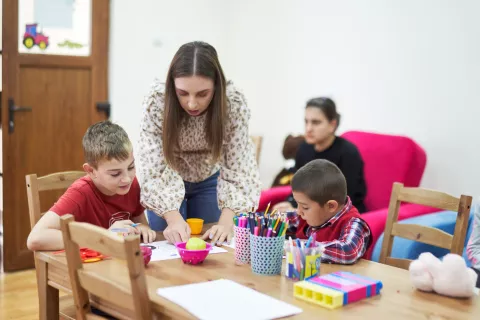UNICEF report: COVID-19 pandemic increases risks to vulnerable children and their families in Romania
The Rapid Assessment carried out by UNICEF together with its partners identifies problems and recommends solutions

- Available in:
- English
- Română
Bucharest, April 29, 2020. In the current context of the COVID-19 pandemic, the already existing vulnerabilities of children, families and communities will increase pre-existing risks: limited access to social services, inequalities in access to education, and poverty, reveals a report coordinated by the UNICEF office in Romania.
The purpose of this first report was to assess the situation of children and families, with a focus on vulnerable groups, in order to enable UNICEF and other relevant actors to adequately establish prevention and response measures to reduce the consequences of the COVID-19 pandemic on three sectors: health, education and social services.
The categories most affected by COVID-19 prevention measures are: children from families living in poverty; Roma children (restricting movement has reduced the income of Roma families); children whose parents have gone to work abroad; children living in overcrowded housing; children with disabilities and the elderly, all affected by the reduction of the activity of family doctors in communities, but also by the decrease of social contact.
Children in the mentioned categories are most often characterized by multiple vulnerabilities: they live in large multigenerational households or in single-parent families, are at risk of poverty, live in overcrowded households.
"In these times of unprecedented crisis, it is necessary to mobilize all resources, material and human, to protect those already vulnerable. Thousands of social workers across the country are working hard to protect children and parents in need. The report presented today is particularly important because it brings into focus the synthetic perception of people working at the grassroots and helps us understand the areas where vulnerability risks increase and find the most effective solutions to reduce them”, said Maria Madalina Turza, President of the National Authority for the Rights of Persons with Disabilities, Children and Adoptions (ANDPDCA).
One third of the subjects who participated in the study believe that the onset of the COVID-19 crisis affected the provision of medical services in their communities, especially the services provided by family doctors. The report recommends a better involvement in the community of the staff from family doctors’ practices, corroborated with the development of the complementary telemedicine services; increasing cooperation between healthcare professionals, social workers and other categories of administrative staff.
The authors of the report note that online education deepens inequalities in access to education for children from disadvantaged families, who are not always able to provide the necessary technological equipment or access to the Internet. The solution could be to implement programs for the distribution of free IT equipment or to facilitate their purchase at subsidized prices for children from low-income families, as well as to provide this equipment for teachers. Recommendations also include the development of a national plan for remote education, including online teaching, and creating support networks between parents, children and teachers to compensate inequalities created by the use of electronic means in education.
Among the problems faced by social services are reduction or even suspension of the activity of day centers and limiting the mobility of workers in the field, especially given the lack of appropriate protective materials. The recommendations are: provision of appropriate equipment to existing staff, especially protective materials; designing detailed procedures for the provision of social services and special protection services during the state of emergency, in order to adapt to it.
"Since the beginning of the state of emergency, UNICEF has drawn attention to vulnerable groups, especially children whose situation is likely to worsen due to the restrictive measures. The Rapid Assessment also shows that in communities where there are health and school mediators, access to health and education services has been less affected. It is an additional argument in support of scaling up to the national level the Minimum Service Package, as successfully implemented by UNICEF in the 50 communities from Bacău County”, said Pieter Bult, UNICEF Representative in Romania.
The Rapid Assessment of the situation of children and families with a focus on vulnerable ones in the context of the COVID-19 epidemic in Romania was conducted together with the National Authority for the Rights of Persons with Disabilities, Children and Adoptions, Research Institute for Quality of Life, the Center for Education and Professional Development Step-by-Step, Terre des Hommes Romania Foundation, the Council of Institutionalized Youth and the Center for Health Policy and Services, Human-DataScience Consulting, with the technical support of the World Bank and the World Health Organization.
You can download the full report here.
Media contacts
About UNICEF
UNICEF promotes the rights and wellbeing of every child, in everything we do. Together with our partners, we work in 190 countries and territories to translate that commitment into practical action, focusing special effort on reaching the most vulnerable and excluded children, to the benefit of all children, everywhere.
For more information about UNICEF and its work for children, visit www.unicef.org.




